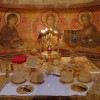Let my readers forgive me, but I am not going to talk on the sublime, as our life is quite prosy in its day-to-day flow. And, as the commemorable Metropolitan Anthony of Sourozh put it, I must preach not to these people, but to “no one but myself.” That’s why I am going to talk in the context of my own situation. I am the father of my family, a priest who is also trying to pursue science. My wife spends nearly all her time with our four children.
Food. Let’s start with the secondary. To be short, the food which we eat during lent should be relatively simple. And let the level of fasting (or rather, level of restraint from certain kinds of food) be defined by every one himself, as it is clear that nearly no layman fasts according to monastic rules. If you cannot eat boiled potatoes without vegetable oil, then add the oil without confusion. You need fish? Then eat it (at least on Saturday and Sunday). Your health doesn’t let you go without milk? Drink kefir – provide yourself with calcium from curd. But when we begin reasoning about squids and other creatures from the sea, it is not fast any more. When we turn the pages of a book named “Orthodox Lenten Cuisine” with interest (with a monk on the cover as a sign of tasty and healthy food), it is not a restraint. When fasting, the food must not occupy our mind at all. You just have your meal and move on.
Neighbors. There are such people (perhaps, they are holy) who visit orphanages, hospitals, hospices, who spend not only their money for other people, not only their time but they give away themselves letting another person’s grief and pain into their souls. Such people are very few. I do not belong to them. Perhaps, many of my readers do not as well. What shall we do then? We just need to accept that we are not better than pagans who love those who love them. Accept the fact and at least try not to be worse than those pagans, that is people who are far from Christ and the Church.
Then what about those who love us? The are, of course, our wife, husband, parents, and children – those who are extremely dear to us and whom we do not even notice sometimes. The fasting period is the most suitable time for understanding that our family needs our attention, the warmth of our hearts, our help. Let the husband start with washing the dishes and taking the garbage out sometimes. Let the wife meet her husband coming back from work with a kiss and a dinner. Let the parents play with their children and not brush them aside like troublesome flies. Let the children not yell on Saturday morning and once in a blue moon give their parents the chance to sleep. And let the whole family at least once a day sit down at the table together, since even such an ordinary thing as a family lunch does not exist anymore.
Praying. How do we pray? We pray the way we should be ashamed of being called Christians. And if you are a priest… Let’s try to remedy the situation. Don’t venture upon the obviously impossible (and sometimes not even useful). Let’s see where we are with this on ferial days. Usually we read our morning prayers either using the shortest version possible or close to the lunch time (as there are lots of household cares in the morning). It means that during Lent, we should make every effort to read our morning prayers on time: when we just got up. Whenever possible, we should read them in full. It will take us little time – around 15 minutes – and bring a lot of benefit.
The situation with the evening prayers is more difficult: we still have lots of domestic cares in the evening and on top of that we deadly want to sleep. So if you are not behind the wheel, you can read the prayers in the subway on your way from work. It is much better than just gazing at the ads. It is very good and useful to read the Holy Scriptures, including the Old Testament. But there’s no need in excessive endeavors here too. At the Lenten daily services the small excerpts from three Old Testament books are read: from the Genesis, the Isaiah and the Proverbs of Solomon. It would be great to read these books during Lent. And if your heart is in the Book of Job or other historical biblical books, nobody would say a word to you.
Church services. The Lent has so many beautiful unique services. We would like to go to church more often, but the lunch is not cooked, the article is not written, the textbook is not read, and we are so exhausted, so tired… Is there any way out? Sure. First of all, we should attend the most important services: the Great Canon during the 1st week, at least once go to the Liturgy of the Presanctified Gifts, pray at the Standing of Maria, and stand by the Cross on Great Friday. And secondly, thank God, we have the opportunity to have the liturgical books at home. And if you cannot buy the Lives of Saints set (and also there is no place to put it), you can easily buy the Triodion of the Lent and read it daily. You don’t even need to buy it, as nearly all liturgical texts are available on the Internet nowadays. And if you don’t understand anything in Church Slavonic, the Russian translations are at your service.
Conquering passions. Many of us have noticed that when lent starts, the temptations fall on immediately. Well, we must gratefully accept these temptations, as due to them we see our weak points. If we have not eaten on time, we become bad-tempered. If we are reproached, we get offended. If we do not manage to do what we promised, we despair. It doesn’t mean that we became worse; God just lets us see a bit of our true characters. Just a bit, as it is terrible to see our precious selves in our entire ugliness – we just wouldn’t stand it. And what we see is the starting point for self-help, the confession subject, the matter for improvement.
The fast is a good reason to finally quit smoking, to recover from soap-opera dependence, to put away computer game discs. The Roman Catholics have a concept of Lenten resolutions: a Christian promises to restrain from something unprofitable or, on the contrary, do some good deeds during Lent. I think it is a good habit for the Orthodox Christians too, but without extra formalization of life.
Internet. If you read this text, it means you have Internet access. It means I don’t need to tell you how difficult it can be to pry yourself away from computer sometimes. On the other end there are so many interesting people to talk to, so many idiots to make them know about it, so many cheeky fellows to be cut down to size. But the lent comes and we understand that we ought to change something. Can we refuse emailing? Hardly. Should we make a vow of silence and not to make LiveJournal postings? I’m not sure. But the most definite thing to be avoided during Lent and on other days is the meaningless browsing of Internet pages and links which are not interesting to us and which we didn’t intend to read. Here’s the reason to put a block, otherwise all our life will pass by.
I admit that for the majority of my readers all the mentioned above is a closed chapter. Well, if it is really so then I am sincerely glad for them. In this case, I cannot but wish them the ceaseless ascension to the heights of the spirit and ask for their prayers for me and my family.
Translated by Elena Demidova
Edited by Yana Samuel




















